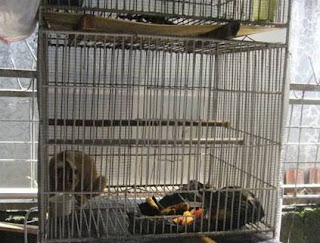UK researcher Richard Moore is working with our team in Java to study the viability of returning captive lorises to the wild.So far we have released four lorises with collars. Sadly one has died of unknown causes. By the time we retrieved the body, it was already starting to decompose so there was no way of conducting a post-mortem investigation. We knew its rough location, but could not see it at first. It was 23m up in a pine tree, which we needed ropes to climb. By the time we had located it, got hold of some ropes and climbed the tree - it looked like it had already been dead for four days or so. It was a great shame, because it appeared to be feeding well, and moving freely up to this point. (Also it was in an area where it was easy for us to follow it).

The other loris released at that time travelled down the mountain, out of the forest and into some gardens. We thought this was dangerous for the loris as there are many dogs in the area and also people working. As the loris was not in thick forest and quite exposed, we figured if the people came across it they might capture it to sell in the markets - so we caught it again ourselves and re-released it higher up. Three days later it was back in the gardens, this time further down, in between houses. It had even crossed a road to get there. I am uncertain why it is choosing to come here, as it is very noisy and slightly exposed. It also seems very happy to travel on the ground – which is quite surprising, although there are some other reports of this. I have seen it travelling across large grassed areas, with its head just bobbing up and down above the grass. Anyway, we recaptured it again, and plan to get its weight back up, then try again in a different location.
In the second release we now have one loris still quite high up the mountain. It is in an area which is virtually impossible to access, owing to the very steep sided cliffs - although we HAVE spent the last week trying to reach it! The signal seems to be moving so it would appear to be still alive, which is the main thing. And in this area it is probably very safe from recapture.
The other loris in the second collared release disappeared for a week (ie. we lost the signal), but last night we managed to track it down again. It has moved right round the mountain and come down a different valley, but is now very close to paddy fields. This may also be a problem, as there are many people working in this area too. However, we are planning to go up there tonight and see how it is doing. Hopefully if we give it some time, it may choose to move back up into a safer location.
 Monti is a female baby orangutan from Delta Pawan. When she arrived at the IAR rehabilitation centre on 30 November last year she was the real baby of the group. Now she is a lot bigger and weighs 5.7 kg. She has also grown dense long hair all over her body.
Monti is a female baby orangutan from Delta Pawan. When she arrived at the IAR rehabilitation centre on 30 November last year she was the real baby of the group. Now she is a lot bigger and weighs 5.7 kg. She has also grown dense long hair all over her body.



